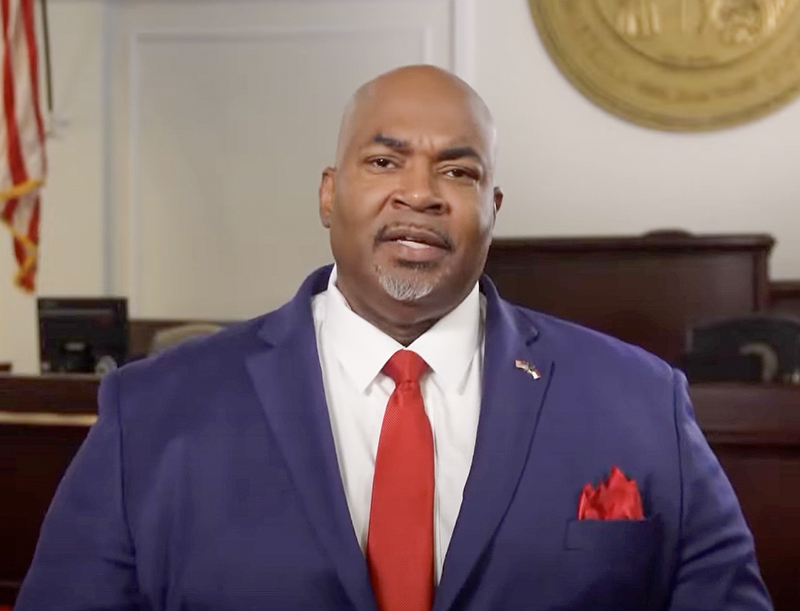U.S. House passes the Equality Act, a landmark LGBTQ rights bill
Bill prohibiting anti-LGBTQ discrimination passes over Republican objections, and is now headed to the U.S. Senate

On Friday, the U.S. House of Representatives overwhelmingly passed the Equality Act, a sweeping, landmark bill that would prohibit discrimination against LGBTQ people in employment, housing, education, credit, and public accommodations.
The House voted 236-173 to pass the bill, which adds those protections to others prohibiting discrimination against certain groups of people under the Civil Rights Act of 1964.
All Democrats and 8 Republicans voted in favor of the measure, with all other Republicans voting against it.
At a press conference held prior to the vote, LGBTQ advocates and civil rights groups celebrated the prospect of the legislation’s passage and called on members of the U.S. Senate to publicly state their position on the bill.
The advocates acknowledged that Senate Majority Leader Mitch McConnell (R-Ky.) would likely try to block a vote on the Equality Act, but insisted that individual senators and Americans throughout the country apply pressure to McConnell to allow an up-or-down vote.
“Once this bill is passed through the House, Leader McConnell must bring it to the Senate floor for a vote,” Mara Keisling, the executive director of the National Center for Transgender Equality, said during the press conference. “We know he doesn’t want to, but denying trans people and LGBTQ people their rights would be nothing short of a moral crime, one that would stain the Senate for years. Now is not the time for partisanship, brinksmanship, or cowardice. Now is the time senators must fulfill their duty to uphold the rights of all people in their states, and serve the interests of the nation over the narrow interests of their party.”
Despite the grim prospects for the bill — due to both McConnell and President Trump’s stated opposition — the advocates nonetheless hailed the day as a historic one, noting that advocates had been crafting the Equality Act over the past five years, but simply had been denied hearings and a floor vote when Republicans controlled the House.
“We are here and the winds of change are at our backs,” said Kierra Johnson, the deputy executive director of the National LGBTQ Task Force. “It feels fitting that yesterday was the anniversary of the Brown v. Board of Education decision, which declared segregation in schools unconstitutional. It was here that the notion of ‘separate but equal’ was delegitimized. ‘Separate but equal’: it is an illusion that has no place in separating us by race, it has no place in separating us by gender identity, it has no place in separating us by sexual orientation. Like Brown, the Equality Act is more than ink on paper….”
“Equality lives in our voices, and today, we sing a little bit louder. Equality lives in our spirit, and our hope for the future is fortified today. As we turn our eyes, ears, hearts and minds to the Senate, I want them to know that championing the Equality Act means championing health for all of us, all the time. It means championing opportunities — the opportunity to thrive, for all of us, all the time. It means championing dignity, for each and every one of us, all the time.”

Lambda Legal’s Sharon McGowan outlined the significance of passing the Equality Act and the effect it would have on how courts interpret the law and uphold LGBTQ people’s rights.
“For 45 years, Lambda Legal has been the law firm for the LGBTQ community. We have taken hundreds of calls every year from people who have experienced discrimination in employment, in housing, in credit, in places of public accommodation, and often, we have not had the tools we needed to address the discrimination they have faced,” McGowan said. “Sometimes that is because it is an area of the law where there are blatantly insufficient protections, other times, it is because there are laws that should help LGBTQ people, but courts have turned a blind eye and said, ‘You’re not welcome here. We are going to read you out of this law.’ The Equality Act will make sure that never happens again.
“The words will be on the page, and be undeniable,” she added. “So even though we know that it is a form of sex discrimination when you terminate someone for having a same-sex spouse, or having undergone a gender transition, the Equality Act today will make sure that no one ever again will be confused about what the law requires.”
During debate on the House floor, each side made their arguments for and against the bill. Supporters of the bill cast it as an advance in civil rights that would give protections to a long-disenfranchised population.
Opponents largely embraced two arguments for why the bill should be defeated: 1) arguing that it would force individuals who oppose homosexuality and same-sex marriage to violate their conscience provide goods and services to LGBTQ people, and could compel religious institutions who rent out properties to the general public to rent out those properties for a same-sex marriage; or 2) arguing that the bill, by allowing transgender females to compete in sports, would take away athletic opportunities guaranteed to women and girls under Title IX.

“This is a work that has been germinating for five years-plus, and many of us have watched and been engaged in meetings and discussion and collaboration to ensure that the bill will reflect all of what America is about,” said Rep. Sheila Jackson Lee (D-Texas). “This bill focuses on saving lives. It focuses on what it means to be transgender and be denied the right to serve in the United States military. Or stands up for African-American transgender women who have been killed in the region that I live in. And it stands up for the person who knocked on the door and could not get housing because of their status.”
“No one who is against this bill is saying that anyone ought to be treated wrongly, badly, in any way,” said Doug Collins (R-Ga.), the ranking member of the Judiciary Committee, who led opposition to the bill on the floor. “I can agree with the intent, I can agree with the idea that no one should be. … This bill is an imperfect step toward making something that others want to be right, but in the end, runs a real risk of causing others harm at the same time.”
Rep. John Lewis (D-Ga.), who was one of the leaders of the original Civil Rights Movement, spoke briefly in favor of the bill, noting that it was being brought up around the anniversary of the Brown v. Board of Education decision.
“I remember that decision. I was 17 years old. I thought that I would be attending desegregated schools,” Lewis said. “It never happened for me. Today, on this day, we have an opportunity to send a message, to help end discrimination in our country, and set all of our people free.”
Rep. Vicky Hartzler (R-Mo.) blasted the bill as a threat to religious people and women throughout the country, particularly focusing on the advantage that transgender women not on hormones will have over cisgender women in athletic activities.
“This bill legalizes discrimination. Government-imposed, top-down discrimination against those with time-honored views of marriage and gender,” she said. “This bill should be renamed the ‘Inequality Act,’ as its policies at the state level have already been used to eliminate safe spaces for women, irreparably harm children, trample parental rights, undermine the free exercise of religion, and dismantle female athletics.”

But Rep. Jerrold Nadler (D-N.Y.), the chair of the Judiciary Committee, pushed back against claims made by Republican lawmakers in his concluding statement.
“This morning we have heard phantom fears about the allegedly harmful effects of the Equality Act on religious freedom and women’s rights,” Nadler said. “If these fears had any basis in reality, then the Equality Act would not have been endorsed by more than 500 civil rights, women’s rights, religious, medical, and other national and state organizations. … The time has come to proclaim liberty and equality throughout the land. I now commend the bill to the judgment of the House, and I commend the House to the judgment of history.”
Rep. Greg Steube (R-Fla.) proposed a motion to recommit the bill, which included provisions to ensure that transgender women engaged in athletics would not be able to take away competitive opportunities from cisgender women.
Steube claimed the motion would ensure that nothing in the bill regarding Title IX or other laws would be interpreted so as to take away rights from women.
But Rep. Katie Hill (D-Calif.), an out bisexual, strongly pushed back against Steube’s motion, arguing that the premise behind it was wrongheaded.
“I don’t know if my colleagues on the other side of the aisle realize they’ve met trans people, but they have. And I’ve met many. And this motion reflects nothing more than the prejudice of my colleagues,” she said. “The Equality Act ensures that LGBTQ women and girls who are lesbian, bisexual, and transgender will all have the same opportunities as their peers, in sports, in housing, in jobs.
“The discrimination that trans individuals face just trying to live their lives every single day is something beyond what most of us could ever imagine,” Hill added. “No trans person is trying to game the system to participate in sports. That does not happen. And that is a sad scare tactic that has no place on the floor of the people’s House…. This is 2019, and we are not afraid of the bogeyman you are trying to create. We are ready to move forward and tell all of our constituents, all of our communities, all Americans, that they matter equally.”
The motion to recommit was soon after defeated on a 228-181 vote, with 1 Republican and 1 Democrat voting against their party’s preferred position.
Support Metro Weekly’s Journalism
These are challenging times for news organizations. And yet it’s crucial we stay active and provide vital resources and information to both our local readers and the world. So won’t you please take a moment and consider supporting Metro Weekly with a membership? For as little as $5 a month, you can help ensure Metro Weekly magazine and MetroWeekly.com remain free, viable resources as we provide the best, most diverse, culturally-resonant LGBTQ coverage in both the D.C. region and around the world. Memberships come with exclusive perks and discounts, your own personal digital delivery of each week’s magazine (and an archive), access to our Member's Lounge when it launches this fall, and exclusive members-only items like Metro Weekly Membership Mugs and Tote Bags! Check out all our membership levels here and please join us today!
























